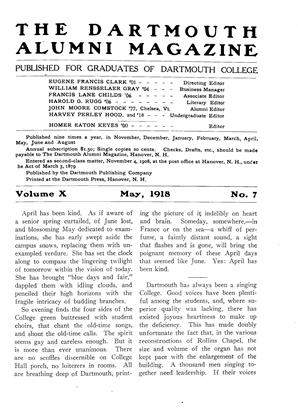Back in the winter, the undergraduates, on their own initiative, voted 3 to 1 in favor of giving up the spring recess and all other College holidays, in order that the College might close early, and that four months instead of three might be available for the summer job. The request was gladly heeded by faculty and trustees, with the result that every week-day since January 8 has also been a work-day, with the single exception of "Town Meeting"; and it is no news to the alumni that Memorial Day will find Hanover a "deserted village."
A. few weeks ago Palaeopitus decided to find out, if possible, how the long summer "vacation" was to be utilized— Was it really going to spell service, in some form; or did it mean simply a lengthened outing? Another question discussed was how an undergraduate who really wanted to work at something worth while could find the right task to undertake. Hoping to approach an answer to these questions, Palaeopitus undertook a sort of census of the three lower classes, by means of the following questions, which were printed on a card and circulated on an announced day, among the students:
The results were tabulated, and a summary of them is presented herewith in the belief that they will be interesting to the alumni:
Number of men filling out the cards ... .642 Number checking one or more of the industries listed......................342 Men whose occupations for the summer are already settled: Military service ........................... 54 Clerks and salesmen ........................ 54 Agriculture ................................ 45 Summer school .............................. 33 Camp work .................................. 15 Technical and scientific work .............. 10 Munition work .............................. 9 Factory work ............................... 9 Hotel work 1 ............................... 9 Mill work .................................. 7 Chauffeurs and auto mechanics .............. 7 Shipbuilding ............................... 5 Aeroplane manufacturing .................... 5 Hospital and medical work .................. 4 Railroad work .............................. 4 Miscellaneous .............................. 22 Nothing .................................... 8 Total ............................300
The list of men who checked the forms of work listed on the cards which they were willing to engage in, is as follows. The first column of figures gives the number who made no condition as to place of work, the second shows those who had a preference for certain sections, and the third gives the totals. The final total makes allowance for men who checked more than one industry:
Munition work .............. 58 42 100 Aeroplane manufacturing .... 92 71 163 Shipbuilding.............. 57 47 104 Farm work ............... 35 23 58 Clerical work .............. 37 63 100 Mechanical work ........... 25 21 46 Mill work ................ 9 8 17 Total ............................ 588
Out of the 642 men who were interrogated, which represents 93 per cent of the entire strength of these three classes, only eight, slightly over one per cent, are willing to be set down as idlers; and it is likely that in some of these few cases health considerations play a part. Three hundred, or 47 per cent, are already placed for the summer, and it is noteworthy that a very large majority of this group will be engaged in some service of real usefulness and significance. For instance, the former small army of Dartmouth "bell-hops" is pretty nearly extinct; but 45 men will come back from the farms in the fall, "hornyhanded sons of toil."
The major problem remaining is, how shall the 342 "willing workers" be connected up with the job? Various means are being utilized by the College in the attempt at solution, and some progress is being made. Before this number of the MAGAZINE reaches its subscribers, a "summer employment" mass meeting will have been held, at which Hon. Clarence E. Carr '75, Director of the U. S. Public Service Reserve for New Hampshire; Mr. J. S. B. Davie, Labor Commissioner of the State; a representative of the Remington Arms Co.; and possibly one or two others representing employers of labor will be present. Here is an opportunity for the alumni to help out; and any suggestions should be sent to Prof. J. L. McConaughy.
But the broader significance of the figures lies in the evidence which they give of the College undergraduate's mental attitude towards the national needs; and there seems to be reason for satisfaction in the showing up to date. The important consideration now is to translate promise into achievement.
Nam .............................................Age............ Class........... Home address ........................College address ............................ Give roughly, height ............ Weight ............ Is your occupation for the summer definitely settled?............ If so, what is it? ............................................................ If not, would you consider work along some line of national importance and usefulness, such as: 1. Munition work ................. 4. Farm work ................. 2. Aeroplane manufacturing ....... 5. Clerical work ..................... 3. Ship building ........ 6. Mechanical work ............... 7. Mill work ......... (Check your preference) State briefly any previous experience ................................................ ...................................................................................... Do you make any condition regarding place of work?................... If so, what? ............................................................
(The above questions are not to be considered as a present offer of work, or as necessarily implying that such will follow. The purpose is to get at the facis, so that it may beknown just what and just how much Dartmouth has to offer in this important field.)
 View Full Issue
View Full Issue
More From This Issue
-
 Article
ArticleHOW JUDAH DANA, DARTMOUTH 1795, WON HIS HANOVER BRIDE
May 1918 By James A. Spalding, '66¹ -
 Article
ArticleCOLLEGE NEWS
May 1918 -
 Article
ArticleMARCH MEETING OF THE TRUSTEES—EXTRACTS FROM THE MINUTES
May 1918 -
 Article
ArticleTHE COLLEGE AND UNIVERSITY PROFESSOR A RELIGIOUS PROBLEM
May 1918 By William Hamilton Wood -
 Article
ArticleLETTER FROM LIEUTENANT J. C. REDINGTON '00
May 1918 -
 Article
ArticleCAMPUS NOTES
May 1918








